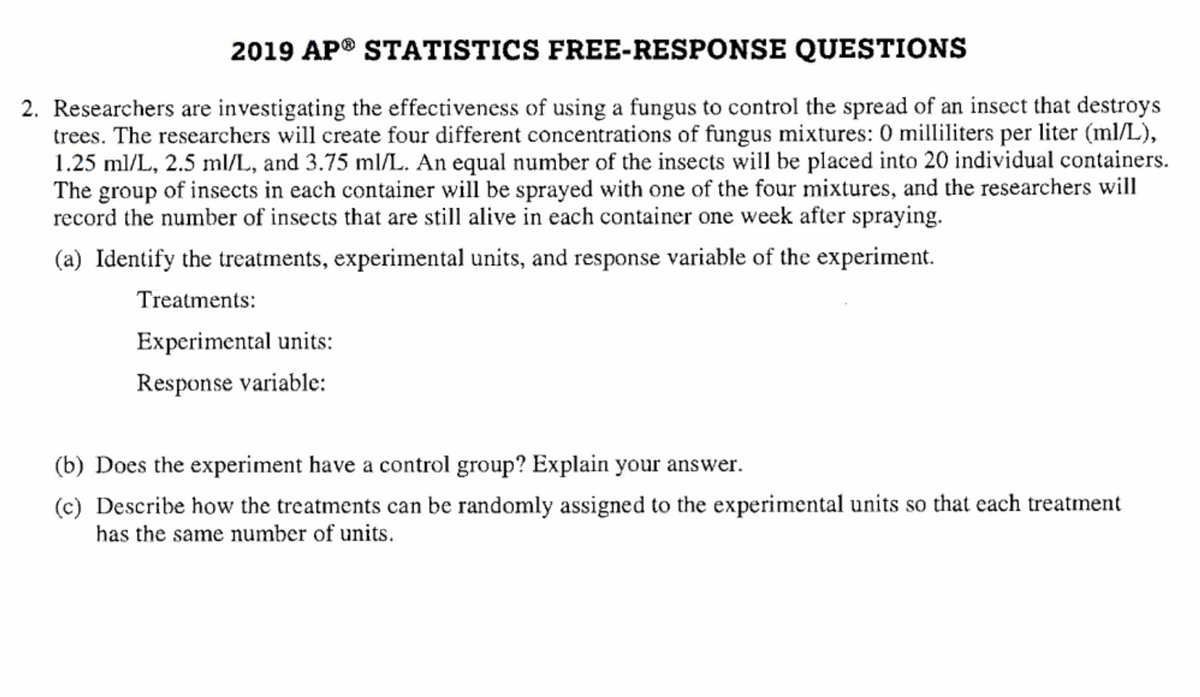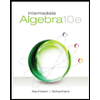Researchers are investigating the effectiveness of using a fungus to control the spread of an insect that destroys trees. The researchers will create four different concentrations of fungus mixtures: 0 milliliters per liter (ml/L), 1.25 ml/L, 2.5 ml/L, and 3.75 ml/L. An equal number of the insects will be placed into 20 individual containers. The group of insects in each container will be sprayed with one of the four mixtures, and the researchers will record the number of insects that are still alive in each container one week after spraying. (a) Identify the treatments, experimental units, and response variable of the experiment. Treatments: Experimental units: Response variable: (b) Does the experiment have a control group? Explain your answer. (c) Describe how the treatments can be randomly assigned to the experimental units so that each treatment has the same number of units.
Researchers are investigating the effectiveness of using a fungus to control the spread of an insect that destroys trees. The researchers will create four different concentrations of fungus mixtures: 0 milliliters per liter (ml/L), 1.25 ml/L, 2.5 ml/L, and 3.75 ml/L. An equal number of the insects will be placed into 20 individual containers. The group of insects in each container will be sprayed with one of the four mixtures, and the researchers will record the number of insects that are still alive in each container one week after spraying. (a) Identify the treatments, experimental units, and response variable of the experiment. Treatments: Experimental units: Response variable: (b) Does the experiment have a control group? Explain your answer. (c) Describe how the treatments can be randomly assigned to the experimental units so that each treatment has the same number of units.
Chapter6: Systems Of Equations And Inequalities
Section: Chapter Questions
Problem 17PS: Cholesterol Cholesterol in human blood is necessary, but too much can lead to health problems. There...
Related questions
Question

Transcribed Image Text:2019 AP® STATISTICS FREE-RESPONSE QUESTIONS
2. Researchers are investigating the effectivencss of using a fungus to control the spread of an insect that destroys
trees. The researchers will create four different concentrations of fungus mixtures: 0 milliliters per liter (ml/L),
1.25 ml/L, 2.5 ml/L, and 3.75 ml/L. An equal number of the insects will be placed into 20 individual containers.
The group of insects in each container will be sprayed with one of the four mixtures, and the researchers will
record the number of insects that are still alive in each container one week after spraying.
(a) Identify the treatments, experimental units, and response variable of the experiment.
Treatments:
Experimental units:
Response variable:
(b) Does the experiment have a control group? Explain your answer.
(c) Describe how the treatments can be randomly assigned to the experimental units so that each treatment
has the same number of units.
Expert Solution
This question has been solved!
Explore an expertly crafted, step-by-step solution for a thorough understanding of key concepts.
This is a popular solution!
Trending now
This is a popular solution!
Step by step
Solved in 4 steps

Knowledge Booster
Learn more about
Need a deep-dive on the concept behind this application? Look no further. Learn more about this topic, statistics and related others by exploring similar questions and additional content below.Recommended textbooks for you


Linear Algebra: A Modern Introduction
Algebra
ISBN:
9781285463247
Author:
David Poole
Publisher:
Cengage Learning

Algebra and Trigonometry (MindTap Course List)
Algebra
ISBN:
9781305071742
Author:
James Stewart, Lothar Redlin, Saleem Watson
Publisher:
Cengage Learning


Linear Algebra: A Modern Introduction
Algebra
ISBN:
9781285463247
Author:
David Poole
Publisher:
Cengage Learning

Algebra and Trigonometry (MindTap Course List)
Algebra
ISBN:
9781305071742
Author:
James Stewart, Lothar Redlin, Saleem Watson
Publisher:
Cengage Learning


Glencoe Algebra 1, Student Edition, 9780079039897…
Algebra
ISBN:
9780079039897
Author:
Carter
Publisher:
McGraw Hill

Intermediate Algebra
Algebra
ISBN:
9781285195728
Author:
Jerome E. Kaufmann, Karen L. Schwitters
Publisher:
Cengage Learning